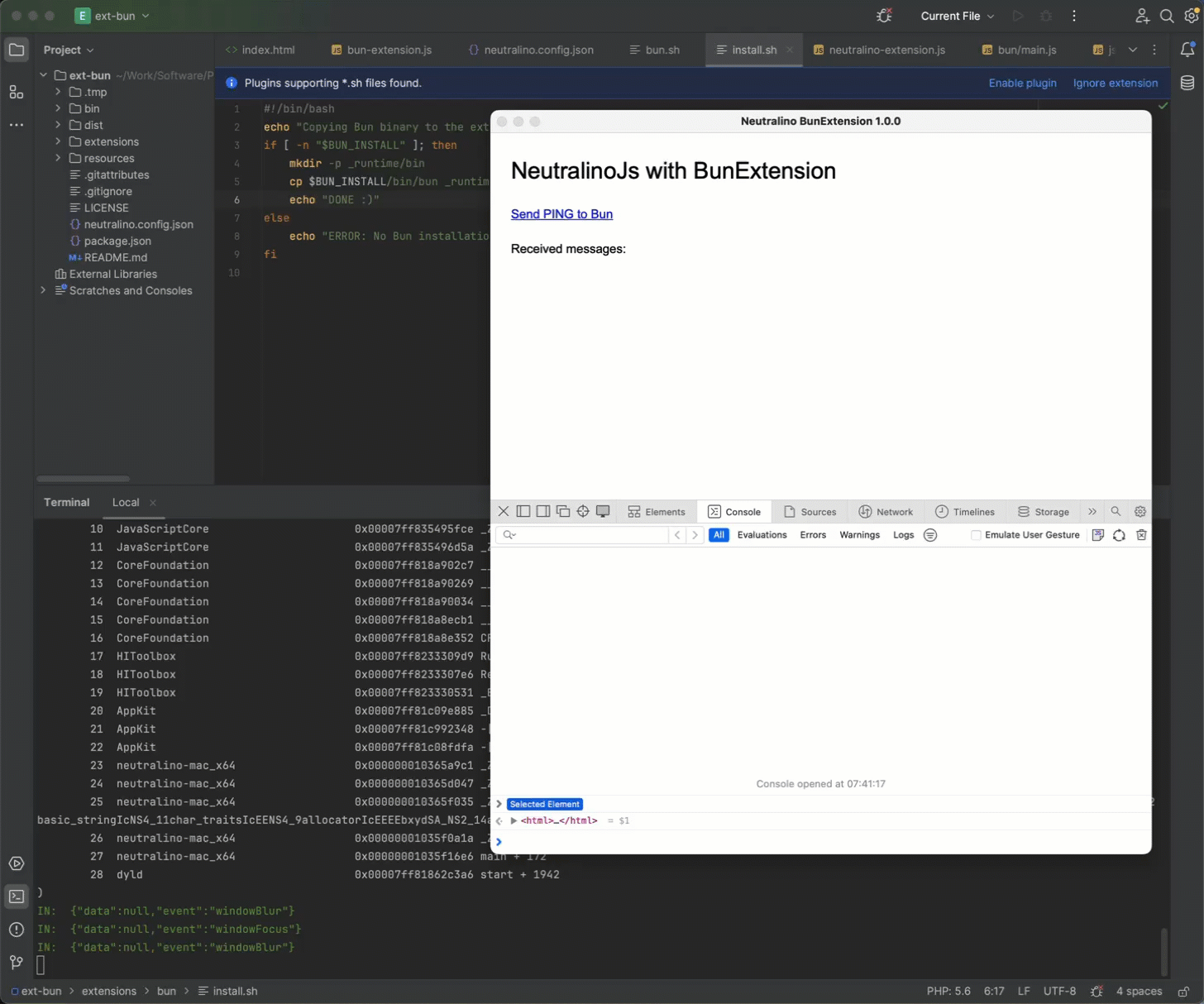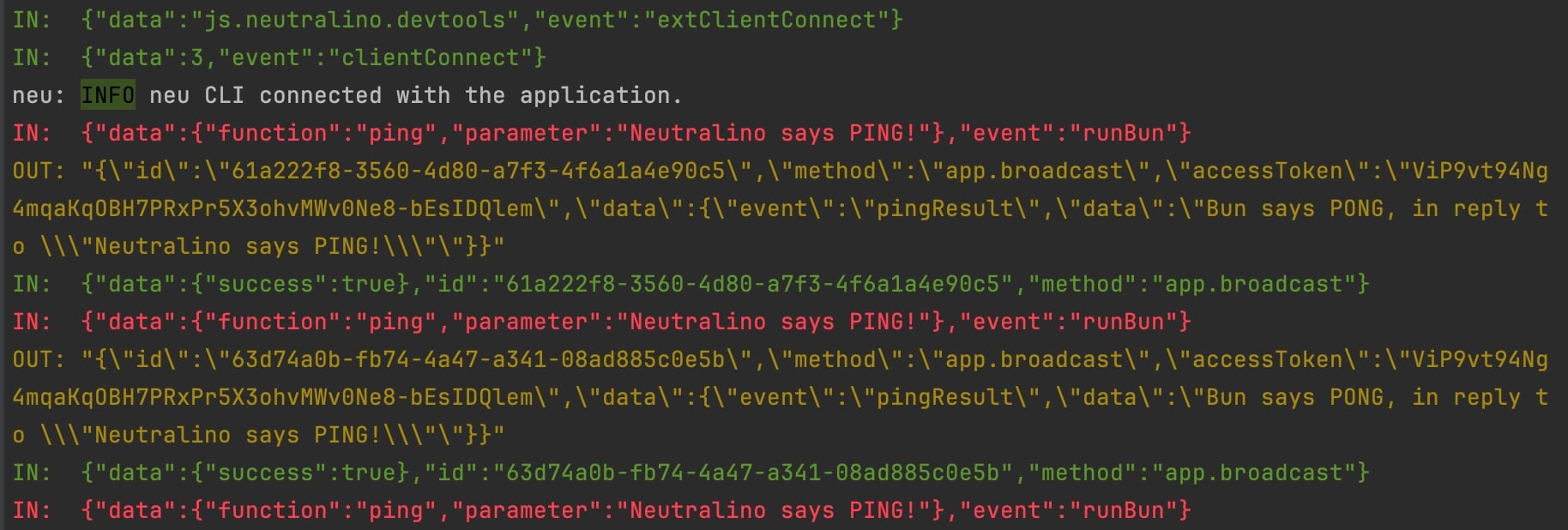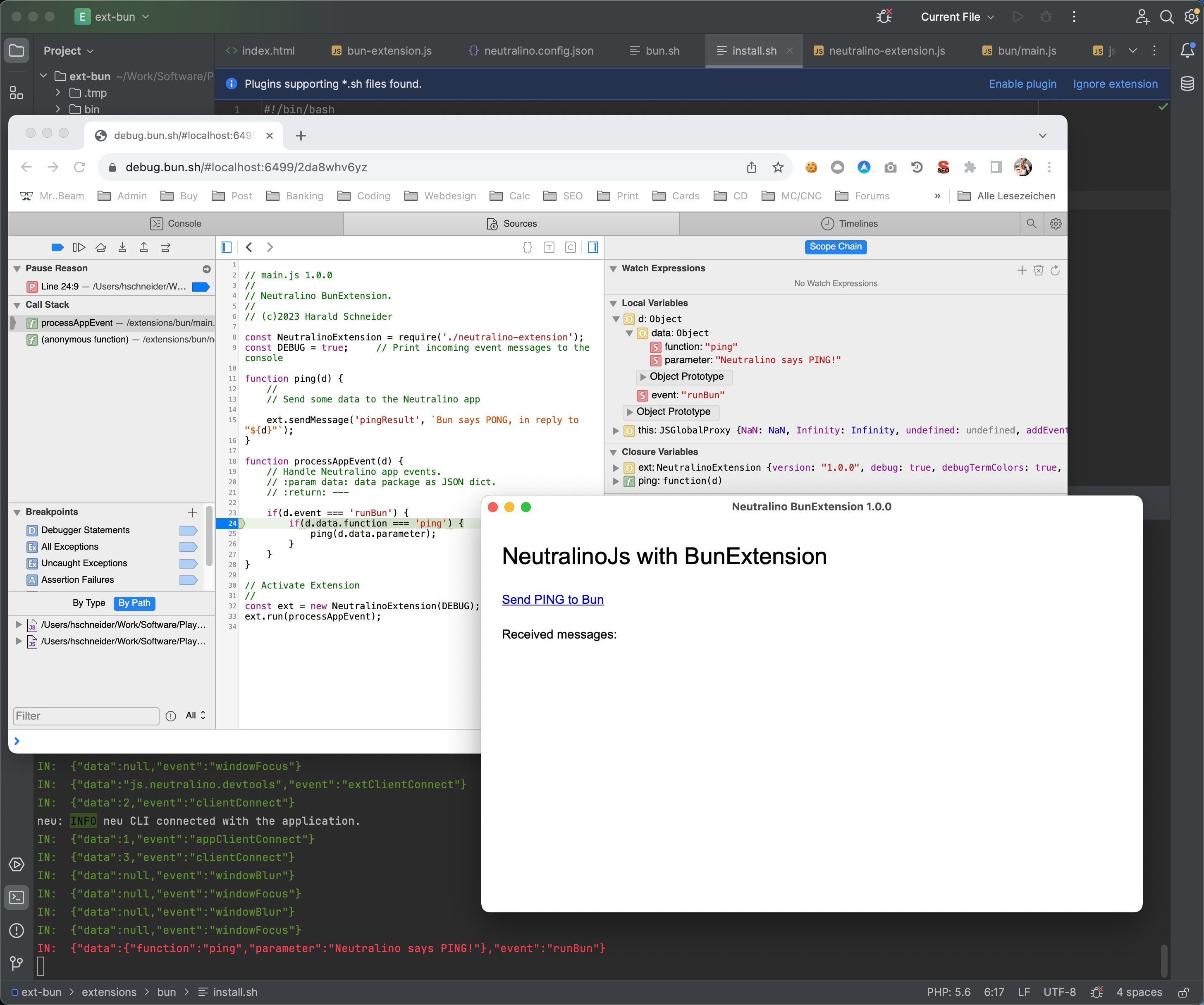A Bun / NodeJS Extension for Neutralino
GREAT NEWS:
This extension also works under Windows now.
But keep in mind, that Bun for the native Windows platform is still work in progress.
To install the latest release see Windows: Get the latest Bun Beta
If you require a more stable NodeJS solution under Windows, check out neutralino-ext-node.
Bun is an all-in-one JavaScript Runtime designed for speed:
- It is extremely fast, in many cases 4 times faster than NodeJS.
- Most NodeJS packages are compatible with Bun.
- You can code in JS, TypeScript, NodeJS, JSX
- It's powerful API comes with the fastest SQlite driver for JS.
- It's all contained in a single file, which can be embedded without dependencies.
This extension adds a Bun backend to Neutralino with the following features:
- Requires only a few lines of code on both ends.
- Read all events from the Neutralino app in your Bun code.
- Run Bun functions from Neutralino.
- Run Neutralino functions from Bun.
- All communication between Neutralino and Bun runs asynchronously.
- All events are queued, so none will be missed during processing.
- Track the data flow between Neutralino and Bun in realtime.
- Use Bun's integrated, browser-based debugger.
- Works in Window- and headless Cloud-Mode.
- Terminates the Bun Runtime when the Neutralino app quits.
This extension does not make Bun/NodeJS transparently available in your NeutralinoJS App. You just call particular functions on a Bun Backend and get back the result.
The demo opens a Neutralino app. Clicking on the blue link sends a Ping to Bun, which replies with Pong. This illustrates the data-flow in both directions.
Before running the demo, the Bun runtime needs to be installed into the extension folder:
cd ext-bun/extensions/bun
./install.shIf you need to install further Packages, use the bun.sh script instead of bun. This starts the relocated runtime instead of your standard Bun installation, e.g.:
cd ext-bun/extensions/bun
./bun.sh install PACKAGEWhen including the extension in your own project, make sure that neutralino.config.json contains this whitelist:
"nativeAllowList": [
"app.*",
"os.*",
"window.*",
"events.*",
"extensions.*",
"debug.log"
],After this, run these commands in the ext-bun folder:
neu update
neu run
Just follow these steps:
- Modify neutralino.config.json, like mentioned in "Run the demo".
- Copy the extensions folder to your project.
- Adapt the JS code in extensions/bun/main.js to your needs.
- Copy resources/js/bun-extension.js to resources/js.
- Add
<script src="js/bun-extension.js"></script>to your index.html - Add
const BUN = new BunExtension(true)to your main.js - Add BUN.run(function_name, data) to main.js to run Bun functions from Neutralino.
- Add event listeners to main.js, to fetch result data from Bun.
Bun allows to build single-file executables, containing all scripts and their dependencies. The run-scripts in extensions/bun will automatically start binaries called main-app (macOS, Linux) or main-app.exe (Windows), when main.js is missing.
So for distributing a binary bundle, all you have to do is:
cd extensions/bun
bun build main.js --compile --outfile main-appAfter this you can delete theses files and folders from the extensions/bun folder:
- *.js
- *.sh
- _runtime
The Bun runtime is extremely optimized for each architecture. As a result, you need different Bun binaries for Intel and Apple Silicon. So the x64 binary won't run in an arm64 environment, even with Rosetta enabled.
Keep this in mind for your build process, when embedding Bun in your app-bundle. These Build Scripts will help you to mange different resources in your build-worflow.
Open a PowerShell and enter:
Set-ExecutionPolicy unrestrictedOpen a fresh PowerShell and enter:
cd ext-bun
export BUN_INSTALL=./extensions/bun/_runtime
irm bun.sh/install.ps1 | iexIf your installation is outdated and you want the latest built, enter:
cd ext-bun
export BUN_INSTALL=./extensions/bun/_runtime
bun upgradeconst NeutralinoExtension = require('./neutralino-extension');
const DEBUG = true; // Print incoming event messages to the console
function ping(d) {
//
// Send some data to the Neutralino app
ext.sendMessage('pingResult', `Bun says PONG, in reply to "${d}"`);
}
function processAppEvent(d) {
// Handle Neutralino app events.
// :param data: data package as JSON dict.
// :return: ---
if(ext.isEvent(d, 'runBun')) {
if(d.data.function === 'ping') {
ping(d.data.parameter);
}
}
}
// Activate Extension
//
const ext = await new NeutralinoExtension(DEBUG);
ext.run(processAppEvent);The extension is activated with the last 2 lines. processAppEvent is a callback function, which is triggered with each event coming from the Neutralino app.
In the callback function, you can process the incoming events by their name. In this case we react to the "runBun" event. data.function holds the requested Bun function and data.parameter its data payload as string or JSON.
if the requested function is named ping, we call the ping-function which sends a message back to Neutralino.
sendMessage() requires the following parameters:
- An event name, here "pingResult"
- The data package to send, which can be of type string or JSON.
The DEBUG variable tells the NeutralinoExtension to report each event to the console. Incoming events, incoming function calls and outgoing messages are printed in different colors. This makes debugging easier, since you can track the data flow between Neutralino and Bun:
Each debug run starts with a link to Bun's integrated, browser-based debugger:
Copy & paste the link into Google Chrome and start your live debug session:
async function onPingResult(e) {
...
}
// Init Neutralino
//
Neutralino.init();
...
Neutralino.events.on("pingResult", onPingResult);
...
// Init Bun Extension
const BUN = new BunExtension(true)The last line initializes the JavaScript part of the Bun extension. It's important to place this after Neutralino.init() and after all event handlers have been installed. Put it in the last line of your code and you are good to go. The const BUN is accessible globally.
The BunExtension class takes only 1 argument which instructs it to run in debug mode (here true). In this mode, all data from the Bun extension is printed to the dev-console:
The pingResult event handler listens to messages with the same name, sent by sendMessage() on Bun's side.
In index.html, you can see how to send data from Neutralino to Bun, which is dead simple:
<a href="#" onclick="BUN.run('ping', 'Neutralino says PING!');">Send PING to Bun</a><br>BUN.run() takes 2 arguments:
- The Bun function to call, here "ping"
- The data package to submit, either as string or JSON.
Below this link, you see
<a id="link-quit" href="#" onclick="BUN.stop();" style="display:none">Quit</a>BUN.stop() is only required, when running Neutralino in cloud-mode. This will unload the BUN runtime gracefully.
| Method | Description |
|---|---|
| NeutralinoExtension(debug=false) | Extension class. debug: Print data flow to the terminal. |
| debugLog(msg, tag="info") | Write a message to the terminal. msg: Message, tag: The message type, "in" for incoming, "out" for outgoing, "info" for others. |
| isEvent(e, eventName) | Checks the incoming event data package for a particular event. |
| run(onReceiveMessage) | Starts the sockethandler main loop. onReceiveMessage: Callback function for incoming messages. |
| sendMessage(event, data=null) | Send a message to Neutralino. event: Event-name, data: Data package as string or JSON. |
| Method | Description |
|---|---|
| BunExtension(debug=false) | Extension class. debug: Print data flow to the dev-console. |
| async run(f, p=null) | Call a Bun function. f: Function-name, p: Parameter data package as string or JSON. |
| async stop() | Stop and quit the Bun extension and its parent app. Use this if Neutralino runs in Cloud-Mode. This is called automatically, when the browser tab is closed. |




